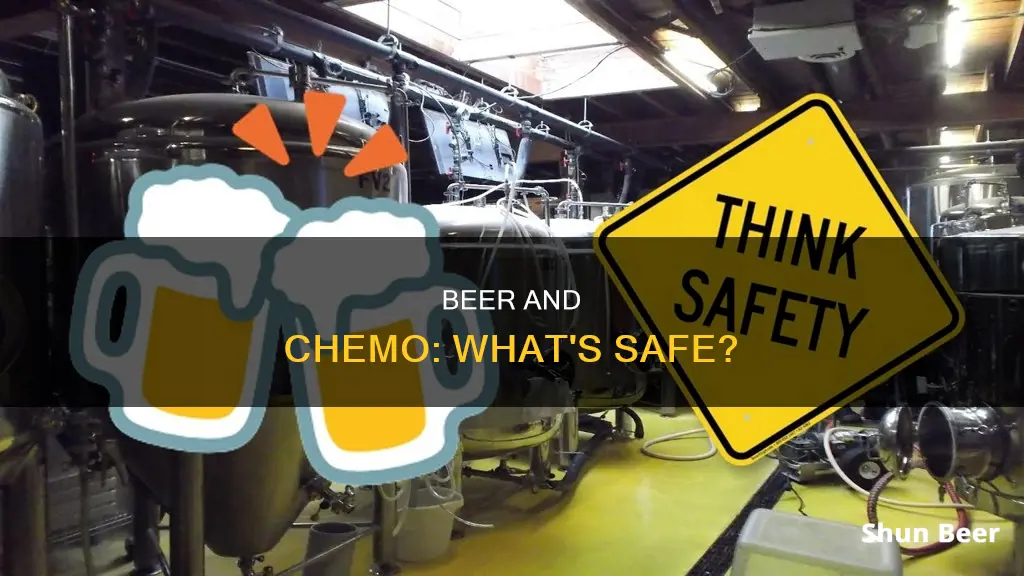
Drinking alcohol is linked to an increased risk of several cancers, including mouth, pharynx, and larynx cancers. Alcohol is a known carcinogen, and it can also worsen the side effects of chemotherapy, such as nausea, dehydration, and mouth sores. However, the safety of consuming alcohol during chemotherapy depends on the treatment regimen and varies from person to person. While occasional beers or glasses of wine are unlikely to have serious effects, it's important to consult with a healthcare professional before consuming any alcohol during cancer treatment. They can advise on potential drug interactions and provide guidance based on individual cases.
| Characteristics | Values |
|---|---|
| Can I drink a beer on chemo? | It depends on the drugs you are having. Check with your healthcare team first. |
| Alcohol and chemotherapy | Alcohol can cause liver inflammation which can interfere with the chemo doing its job. |
| Alcohol and cancer | Alcohol is a known cancer-causing agent. |
| Recommendations | It's best to avoid alcohol during cancer treatment and limit consumption for overall survivorship. |
What You'll Learn

Alcohol can cause liver inflammation, impacting chemo's effectiveness
Alcohol-related liver disease (ALD) is caused by drinking more alcohol than the liver can process, which damages the organ. The liver is responsible for breaking down alcohol, and if it is overwhelmed, it can become damaged. This damage can take the form of inflammation, swelling, and scarring of the liver, which is known as fibrosis. ALD can be fatal, and even those who do not develop ALD can still experience liver inflammation from alcohol consumption.
Chemotherapy drugs and alcohol are both processed by the liver. If someone is undergoing chemotherapy treatment, drinking alcohol can cause liver inflammation, which can interfere with the chemotherapy's effectiveness. In addition to this direct impact on the liver, alcohol can also worsen certain side effects of chemotherapy, such as dehydration, mouth sores, nausea, and vomiting. It can also interfere with sleep and increase the risk of depression.
Therefore, it is generally recommended that those undergoing chemotherapy treatment avoid alcohol consumption. It is important to consult with a healthcare professional before consuming alcohol during chemotherapy, as certain chemotherapy drugs can have specific interactions with alcohol that may cause adverse effects.
Beer and Breastfeeding: Can Beer Boost Milk Production?
You may want to see also

Alcohol can worsen chemotherapy side effects
While undergoing chemotherapy, it is best to avoid alcohol, as it can worsen side effects and cause other complications.
Alcohol and chemotherapy drugs are both processed by the liver. Alcohol can cause liver inflammation, which can interfere with the breakdown of chemotherapy drugs, reducing their effectiveness.
Additionally, alcohol can worsen chemotherapy-induced mouth sores and increase pain. It can also irritate the stomach and aggravate nausea and vomiting.
Some specific chemotherapy medications interact with alcohol, causing or worsening side effects such as dizziness, drowsiness, nausea, and vomiting. For example, drinking alcohol with Matulane (procarbazine), a drug used for the treatment of stage 3 and stage 4 Hodgkin lymphoma, can increase central nervous system side effects, including loss of balance, headaches, drowsiness, or dizziness.
Alcohol can also have indirect effects on chemotherapy treatment and a person's ability to cope. It can worsen dehydration, sleep disturbances, and depression, which is common in people with cancer.
Furthermore, alcohol can interfere with the production of blood cells, potentially worsening bone marrow suppression in people undergoing chemotherapy. This risk is highest among heavy drinkers but can also affect moderate drinkers.
Therefore, it is generally recommended to avoid alcohol during chemotherapy to prevent these potential complications and side effects. It is important to consult with a healthcare professional to determine if it is safe to consume alcohol before or after specific chemotherapy treatments.
Beer and Teenagers: What's the Deal?
You may want to see also

Drinking alcohol during chemo may increase the risk of complications
Drinking alcohol during chemotherapy can be risky. While a glass of wine or beer may not affect most types of chemotherapy, it's important to check with your doctor first. Some chemotherapy drugs interact with alcohol and can cause unpleasant side effects or make existing ones worse. Excessive drinking is never a good idea when undergoing treatment.
Alcohol and chemotherapy drugs are both processed by the liver. Consuming alcohol during chemotherapy could cause liver inflammation, which may interfere with the effectiveness of chemotherapy. Alcohol can irritate the stomach and worsen chemotherapy-induced nausea and vomiting. It can also dehydrate you, exacerbating the effects of vomiting, diarrhoea, or excessive urination.
Alcohol may also increase the side effects of certain chemotherapy drugs. For example, drinking alcohol with Matulane (procarbazine), used to treat Hodgkin lymphoma, can increase central nervous system side effects like loss of balance, headaches, drowsiness, or dizziness. Combining alcohol with Gleostine (lomustine), used for Hodgkin lymphoma and metastatic brain cancer, can lead to nausea and vomiting.
Additionally, alcohol can worsen chemotherapy-induced mouth sores and increase pain. It can also interfere with sleep, increase the risk of depression, and negatively impact bone marrow suppression.
There is limited research on the impact of alcohol consumption on cancer survival times. However, some studies suggest that alcohol can lead to worse outcomes for certain cancers, such as head and neck cancers. Alcohol use has also been linked to an increased risk of recurrence for women taking hormone therapy for estrogen-receptor breast cancer.
In summary, drinking alcohol during chemotherapy may increase the risk of complications. It is essential to consult with your healthcare team to determine if it is safe to consume alcohol before or after specific chemotherapy treatments.
Beer and Cataract Surgery: What You Should Know
You may want to see also

Alcohol can irritate and worsen mouth sores
Alcohol and Chemotherapy
It is important to consult with your doctor or healthcare team about drinking alcohol during chemotherapy. While drinking a little alcohol won't affect most types of chemotherapy, certain chemotherapy drugs interact with alcohol and can have adverse effects on your health.
Chemotherapy-induced mouth sores are a common side effect of cancer treatment. Alcohol can irritate these sores and increase pain and discomfort. Mouth sores may appear 1 to 2 weeks after the start of treatment and may persist during treatment. They usually take 2 to 4 weeks to fully heal after treatment ends, often being at their worst 7 days after chemotherapy.
Alcohol-based mouthwashes and mouth rinses can also irritate and dry out your mouth, making you more susceptible to mouth sores and discomfort. It is recommended to use bland mouth rinses, such as baking soda, salt water, or saline rinses, to keep your mouth clean and soothe any irritation. Maintaining good oral hygiene and dental care before and during cancer treatment can help prevent and manage mouth sores.
In addition to irritating mouth sores, alcohol can have other detrimental effects when combined with chemotherapy. It can worsen nausea and vomiting, cause dehydration, interfere with blood cell production, and negatively impact sleep and mental health. Therefore, it is crucial to consult with your healthcare team to understand the specific risks associated with your treatment plan and make informed decisions about alcohol consumption during chemotherapy.
Drinking Beer on Destin Beach: What You Need to Know
You may want to see also

Alcohol can cause dehydration, impacting chemo patients
Drinking alcohol during chemotherapy can have several negative consequences. One of the most concerning issues is dehydration. Alcohol is a diuretic, which means it increases the production of urine, leading to fluid loss from the body. This effect is particularly harmful to patients undergoing chemotherapy, as chemo often causes dehydration due to vomiting, diarrhea, or excessive urination.
The combination of alcohol and chemotherapy can, therefore, lead to severe dehydration, which can have serious health implications. Dehydration can affect the body's ability to absorb and utilise essential nutrients, further compromising the patient's health and recovery. It can also impact the effectiveness of chemotherapy drugs, as adequate hydration is necessary for the proper breakdown and absorption of medications.
In addition to dehydration, alcohol consumption during chemotherapy can worsen mouth sores, a common side effect of chemo. Alcohol can irritate these sores and increase pain, making it difficult for patients to eat, drink, or speak comfortably. The dehydrating effects of alcohol can further exacerbate this issue, as a well-hydrated mouth is crucial for oral health and healing.
Furthermore, alcohol can interact with specific chemotherapy drugs, such as Matulane (procarbazine) and Gleostine (lomustine), leading to increased side effects like nausea, vomiting, dizziness, and drowsiness. It can also interfere with the effectiveness of chemotherapy by causing liver inflammation, which impairs the breakdown and absorption of chemo medications. Alcohol may also negatively impact sleep, increase the risk of depression, and suppress the immune system, all of which can affect a patient's overall health and ability to cope with treatment.
While it may be tempting to reach for an alcoholic beverage to relax or socialise, it is crucial for chemo patients to be aware of the potential risks associated with alcohol consumption. Patients should consult their healthcare team for personalised advice and to determine if it is safe to consume alcohol during their specific chemotherapy treatment. Prioritising hydration and overall health is essential to ensure the best outcomes during this challenging time.
Ice-Cold Beer: Enhancing or Ruining Your Drinking Experience?
You may want to see also
Frequently asked questions
It depends on the drugs you are having. It's best to check with your healthcare team first. Generally, drinking a little alcohol won't affect most types of chemotherapy, but frequent or heavy drinking is not recommended.
Alcohol can irritate mouth sores or even make them worse. It can also worsen side effects of chemotherapy, such as dehydration, nausea and vomiting. It can also cause liver inflammation, which can interfere with the effectiveness of chemotherapy.
Women should have no more than one drink per day and men should have no more than two drinks per day.







